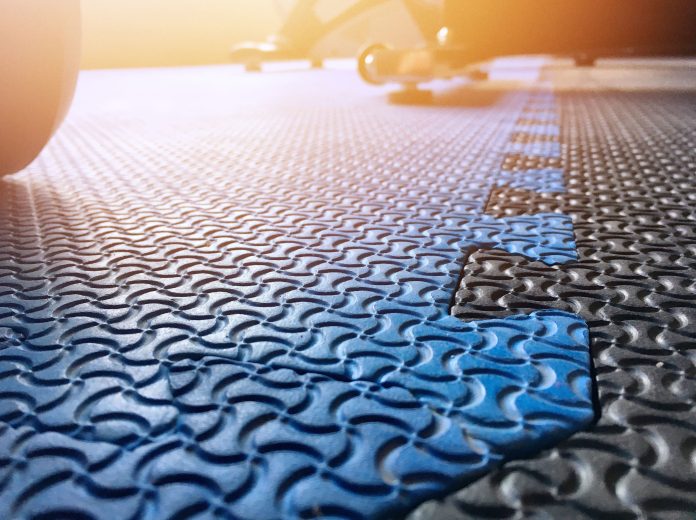Rubber flooring is a popular choice for many reasons. It’s easy to clean, durable, and looks great. But how long does rubber flooring last? In a household setting, most rubber floors will last around ten years. In a commercial environment, rubber floors may last up to 20-25 years.
You are a homeowner looking for a new floor for your home. You have seen many different types of flooring, but you’re not sure what type is best for your home.
Rubber flooring is affordable, durable, and easy to install. Rubber Flooring can help you make the right choice!
How do You Maintain a Rubber Floor?
1. Regular cleaning and maintenance
Rubber flooring is a popular choice for both residential and commercial settings. It is durable, easy to clean and maintain, and comes in various colors and styles. However, like any other type of flooring, rubber requires regular cleaning and maintenance to keep it looking its best.
The easiest way to clean rubber flooring is with a damp mop. Be sure to use a non-abrasive cleaner or detergent, and avoid getting the floor too wet. Let the floor dry completely before walking on it.
If the floor becomes stained or dirty, you can use a cleaner specifically designed for rubber floors. Be sure to follow the manufacturer’s instructions carefully. In general, it is best to test any new cleaners in an inconspicuous area before using them on the entire floor.
2. Proper installation
The popularity of rubber flooring is on the rise. It is often chosen for its durability and easy installation. Rubber flooring can be installed in various ways, but the most common is to glue it down to the subfloor. To ensure a proper installation, follow these simple steps:
- First, remove any existing flooring and clean the subfloor thoroughly.
- Next, measure the area to be covered and cut the rubber sheeting to size. Leave a 1/4-inch margin around the edges.
- If using adhesive, spread it liberally over the subfloor using a trowel. Be sure to get into all of the cracks and corners.
- Place the rubber sheeting in position and press firmly into the adhesive. Leave it undisturbed until it dries completely (usually overnight).
3. Choosing the correct type of rubber flooring
There are many different types of rubber flooring on the market, and choosing the right one for your needs can be challenging. Here are some tips to help you make the right decision:
- Decide what you will be using the rubber flooring for. There are different types of rubber flooring for various purposes. For example, if you need a durable floor that can withstand heavy traffic, you should choose a variety of rubber flooring designed for commercial use.
- Consider your budget. Rubber flooring can be expensive, but there are many affordable options available. Choose the type of rubber flooring that fits your budget and meets your needs.
- Consider the climate where you live. If you live in a warm environment, you will need a type of rubber flooring resistant to heat and moisture.
4. Protecting your rubber flooring
The use of rubber flooring is becoming more and more popular because of its many benefits. Rubber flooring is durable and easy to clean, making it the perfect flooring option for high-traffic areas. However, like any other type of flooring, rubber flooring can be damaged if not adequately protected.
Here are a few tips for protecting your rubber flooring:
- Use mats or rugs at entrances and exits to help protect the floors from dirt and debris.
- Placemats in areas where water or other liquids are likely to be spilled.
- Clean up spills as soon as they occur.
- Avoid using harsh chemicals or abrasive cleaners on rubber flooring.
5. Using the Right Cleaning Products
It is essential to use the right cleaning products for rubber flooring. For example, a vinegar and water solution can be used to clean most types of rubber flooring.
Be sure to test the solution in an inconspicuous area before using it on the entire floor. If you have a stain on your rubber flooring, you can use a commercial cleaner or a homemade cleaner made from dish soap and hydrogen peroxide.
Are rubber Floors Durable?
There are pros and cons to every flooring type, with rubber no exception. One big question people have when it comes to rubber floors is whether or not they are durable.
The answer to that question depends on the specific flooring material you are looking at and how it is installed. Some rubber flooring options, like rolled rubber, can be durable if installed correctly. However, other options, like interlocking tiles, may not be as challenging as people expect them to be.
It is essential to research before making a purchase and consult with a professional if you are unsure how to install the flooring yourself. Rubber floors can be an excellent option for durability, especially in high-traffic areas. Make sure you choose the right type of flooring for your needs and installation requirements.
Conclusion
In conclusion, according to the Agmat, rubber flooring is an excellent option for those looking for a durable and long-lasting flooring solution. In addition, it is resistant to most common stains and damage, making it an ideal choice for high-traffic areas.
Rubber flooring is also easy to maintain, making it a hassle-free option for busy homeowners. Rubber is an excellent choice if you’re looking for a flooring option that will last for years!














